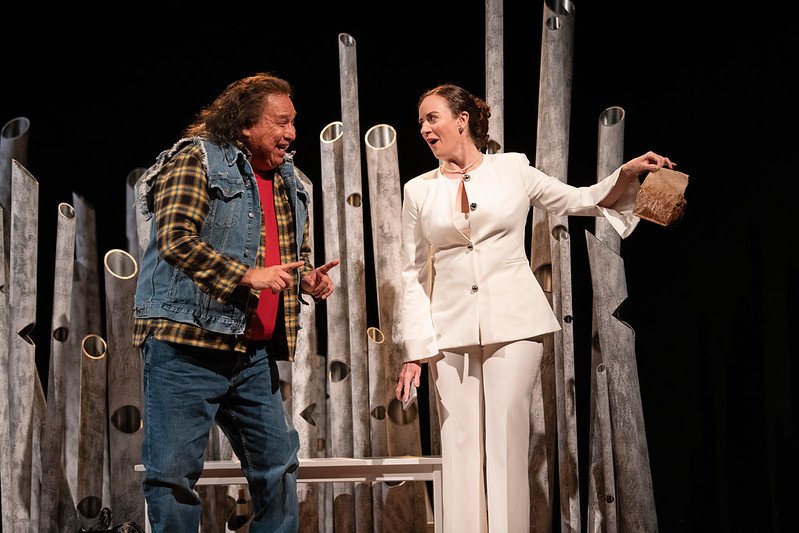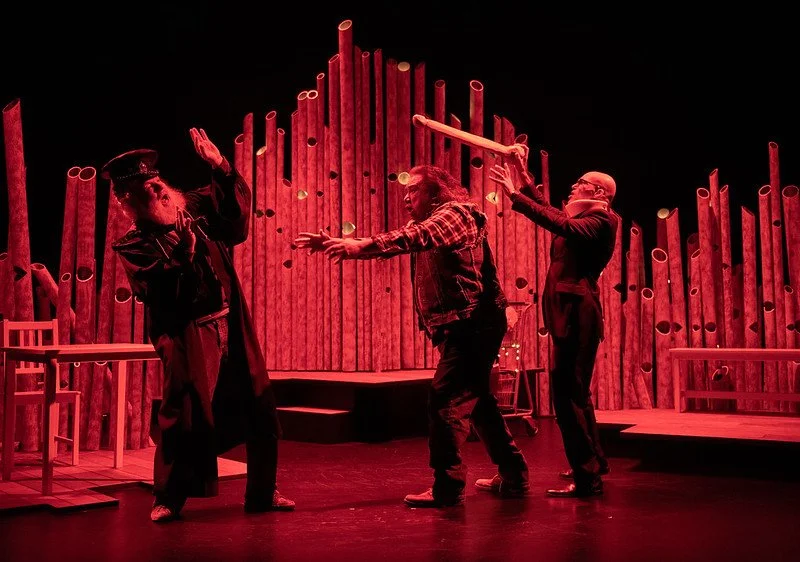Kevin Loring aims to turn things upside-down and shake them up with Little Red Warrior and His Lawyer
Playwright-director says his new land-claims farce “slays everything”
Sam Bob and Luisa Jojic star in Little Red Warrior and His Lawyer. Photo by Emily Cooper
The Cultch and Savage Society present Little Red Warrior and His Lawyer, at the York Theatre from March 3 to 13
CELEBRATED Nlaka’pamux playwright Kevin Loring has been revisiting the script for Little Red Warrior and His Lawyer for almost 20 years.
But it’s fitting that this era of turmoil finally marks the debut of what he calls a “land-claims farce”: in the comedy, Loring gleefully upends institutions and stereotypes.
“In relation to the pandemic, I really wanted to put out a comedy—something we could laugh at,” he begins, speaking to Stir from Ottawa, where he’s the National Arts Centre’s director of Indigenous theatre, before heading West for the show’s opening at the York Theatre. “It kind of slays everything. ‘Irreverent’ would be an enormous understatement. It comes from that desire to turn everything upside down and shake it and see where it ends up.”
In the play, which Loring also directs, Little Red (Sam Bob), the last remaining member of his tribe, discovers that a land-development firm has sent construction crews to his traditional territory. After attacking one of their engineers, he’s arrested and is assigned a court-appointed lawyer. Things turn even more farcical when Red is forced to move in with that lawyer and his wife—who finds herself strangely attracted to the newcomer.
Writing the work, which he started way back in theatre school, Loring took his cues from snk̓ y̓ép, or Coyote, the Trickster in the Nlaka’pamux stories he grew up with. But instead of a single character, Loring describes the whole outrageous universe of the play as the Trickster.
Kevin Loring
“It was the intention of wanting everything to be tricky,” Loring explains. “There's a lot of storytelling in it, and the narrator, Floyd, is himself a Trickster or a transformer. The other element is all the characters transform throughout the show.
“So aspects of duality are present throughout–one thing can be two things. I’m just having fun with that,” adds Loring, who developed the characters collaboratively with his cast when the show had its world premiere at Victoria’s Belfry Theatre in early February. “And I’m really playing on those stereotypes—the lawyer, the ‘Karen’, an Indigenous man, a homeless man—and twisting them upside down. Nobody gets away with anything.”
Beneath all the humour, of course, is a serious subject. That’s no surprise, considering that this is the same playwright who wrote the powerful residential-school work Where the Blood Mixes, which earned him a Governor General’s Award in 2010. In the world of Little Red Warrior and His Lawyer, judges reject Indigenous land claims. The reality today is a little more complex, Loring observes: “You have this phenomenon right now where, legally, First Nations are winning these battles and affirming their rights to the land. But the government doesn't implement what the outcome of these court cases are.” Loring points to the prosecution of Indigenous people for hunting and fishing on their own territory, despite what’s happening in the courts. “I think we’re at a place of status quo in a certain way.”
With Little Red Warrior and His Lawyer, Loring says he doesn’t want to portray the specific details of land-claims struggles, but get at the larger, unsettling truths of Indigenous relations in this country. And though he uses broad, over-the-top, and often physical humour, borrowing from the warped sensibility of memes, Loring ultimately wants to make you question what’s happening.
“I kind of lampoon everything, so you’re having a laugh about it and feeling uncomfortable about it,” he says. “A lot of the humour is to put you off-balance.”
Photo by Emily Cooper
















